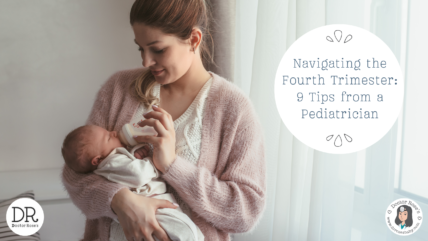Having a child is a lifechanging experience, but it can also change your life in a way that you might not expect: postpartum depression.
Baby blues are a part of being a new mom. It is normal to experience mood swings, anxiety, trouble sleeping, sadness, and other unexpected emotions after giving birth to a baby. Your body has just undergone a tremendous change, and needs time to adjust to your new state. But sometimes, these symptoms can be more pronounced or severe. They can happen near the end of pregnancy, or even up to a year after you have given birth.
The most important thing to note is that postpartum depression is not uncommon, and doesn’t mean that you’re a bad mother. However, taking care of your baby when you’re experiencing postpartum depression also means taking care of yourself.
Determining Whether You Have Postpartum Depression
The first step in treating postpartum depression is recognizing that you have a problem. It is normal to experience intense feelings after giving birth to a child, but when these continue for a prolonged period of time or become more acute over time, it may be more than just baby blues.
While there is no single cause for PPD, there are several factors that contribute to it. After giving birth, you will experience a dramatic drop in hormone levels, and your body will need to adjust. Emotional issues, due to stress, lack of sleep, or a history of depression, can contribute to this.
Some signs to look out for are:
- Intense emotions continuing longer than two weeks after childbirth
- Feelings of depression or anxiety increasing
- Having difficulty caring for your baby
- Thoughts of self-harm
Symptoms experienced during the baby blues can typically be managed from home. But when these escalate into postpartum depression, seek help as soon as you can. PPD is manageable, and when diagnosed early, can be treated properly.
Caring for Baby During a Depressive State
The six weeks after giving birth, the postpartum period, are a period in which you will need to focus on healing. Soreness is common. Your perineum needs to heal, which can take longer if you had a perineal tear or an episiotomy.
If you’re a mother experiencing postpartum depression, this healing period will be more difficult. You might not feel like doing much at all. However, it is important for both you and your baby that you maintain and nurture your relationship. This stage, called attachment, is critical for the psychological development of a baby, and can also release endorphins in your body, helping alleviate some of the symptoms common with PPD.
Relying on family and friends is also crucial. Don’t be afraid to reach out. Mothers like you have gone through this before and understand what you’re feeling, and have likely relied on others themselves. Right now, the most important thing is taking care of both your baby and your mental health.
During this phase:
- Get enough sleep – Don’t skimp on the shut-eye! Sleep deprivation can exacerbate the symptoms of depression, and makes it more difficult to do the things you love.
- Focus on the priorities – Your priority during this time is you and your baby. Focus on this first – putting some housework aside is okay, and friends and family may be more than willing to pick up some of the slack.
- Listen to your doctor – After a PPD diagnosis, it is important to keep the things your doctor has told you top of mind. Sticking to a routine, or taking any medications prescribed to you, can help alleviate symptoms.
- Find time for yourself – Being a mother is a full-time job, but that doesn’t mean you can neglect yourself. Make time for yourself every day, whether that is just a short walk outside, light exercise, or spending one-on-one time with your partner.
Experiencing Postpartum Depression? You’re Not Alone
Postpartum depression affects nearly 15% of all new moms every year. While the symptoms may not be pleasant, millions of moms know exactly what you’re going through, and support is available. Finding the resources and tools that you need can help steer you out of the blues.
Dr. Rose’s Baby is a nasal aspirator designed with ease-of-use first. A congested baby is less likely to get sleep – which is just as important for you as it is for your child! Invented by a pediatrician who is also a mother, we understand that your well-being is also tied up in your baby’s continued health. Check out our product and see why more mom’s are choosing roses for noses!
Disclaimer: This blog provides general information and discussions about health and medical issues and is provided as an entertainment and informational resource only. It is not to be used or relied on for any diagnostic or treatment purposes. This information does not create any patient-physician relationship, and should not be used as a substitute for professional diagnosis and treatment. This blog is opinion based and these opinions do not reflect the ideas, ideologies, or points of view of any potentially affiliated organization. The information on this blog may be revised and/or otherwise managed.



Leave a Reply
You must be logged in to post a comment.